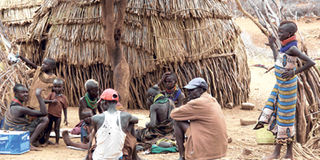How 40-year deal has created peace haven in volatile region

Families relax at a homestead in Lokiriama, Turkana County, on June 4, 2015. The village enjoys peace, thanks to a peace deal signed 40 years ago. JARED NYATAYA | NATION MEDIA GROUP
What you need to know:
- Leaders from Turkana, Baringo, West Pokot and Samburu counties recently embarked on a peace caravan to urge residents to embrace peaceful coexistance and stop the attacks, which have claimed more than 100 lives in the past two months.
- The Kenyan team was led by then Turkana district commissioner David Olocho and six elders while the Ugandan team was represented by Matheniko chief Akwalem Tioko and five elders.
- Governor Josphat Nanok said many projects in Turkana, Baringo and West Pokot have stalled due to insecurity.
A village in Turkana County remains a peace haven despite being in the midst of a region heavily hit by banditry.
Residents of Loima are basking in peace, thanks to a pact signed by pastoralists from Kenya and Uganda more than 40 years ago.
They have been enjoying the peace even as their counterparts in the eastern and southern parts of Turkana continue to suffer due to incessant cattle raids and bandit attacks.
Leaders from Turkana, Baringo, West Pokot and Samburu counties recently embarked on a peace caravan to urge residents to embrace peaceful coexistance and stop the attacks, which have claimed more than 100 lives in the past two months.
The situation is different in Lokiriama, situated on the Kenya-Uganda border, where the Turkana and Karamajong communities enjoy booming trade.
This is as a result of the Lokiriama Peace Accord signed in 1973 to promote peaceful coexistence among pastoralists in the two countries.
“We rarely encounter acts of lawlessness in the border region and those who engage in crime are punished under communal acts,” said Mr Mark Ajon Lokwawi, Lokiriama assistant chief.
At Lokiriama Village, some 120 kilometres southwest of Lodwar Town, is Lokiriama Monument, which signifies the peace agreement negotiated by elders and local administrators from Kenya and Uganda.
It is at this monument that guns, spears, arrows, traditional razor blades and knives were buried as a sign of peace to end animosity dating back to 1959.
The fights involved the Turkana and Pokot from Kenya, Tepes and Karamojong of Uganda, as well as the Merille, Nyangatom and Toposa from South Sudan.
“The fights took place between Mt Moroto in Uganda and Mt Loima in Kenya before elders initiated the peace agreement that has proved beneficial to all communities,” said Mr Emmanuel Imana, Turkana County peace ambassador.
The monument bears the names of the leaders, who facilitated the peace campaign.
KENYAN TEAM
The Kenyan team was led by then Turkana district commissioner David Olocho and six elders while the Ugandan team was represented by Matheniko chief Akwalem Tioko and five elders.
Since the monument was officially unveilled in 2003 by then Minister of Internal Security Chris Murungaru, pastoralists from Kenya, Uganda, South Sudan and Ethiopia have held annual commemorations at the site.
Among measures put in place to sustain the treaty are stiff penalties imposed on aggressors and compensation for anyone killed during an attack.
The Turkana community is set to pay compensation next week after two members of the Karamojong were killed near the Moroto border point.
Although the community is ready to pay the price, the Tepes from Uganda have been blamed for the killing.
“We are ready to defend the peace agreement at all costs, including paying compensation for the killings that we believe we were not responsible for,” said Mr Imana.
The two were killed as they were returning home from Lokiriama market.
Residents who spoke to the Nation said the killing has not interfered with cross-border trade and the prevailing peace in the region. “We will continue honouring the peace agreement,” said Mr Martin Owini from Lira, Uganda.
Mr Musa Odoch, a trader from Gulu, Uganda, said the peace pact has boosted cross-border trade and promoted intermarriages among pastoralist communities.
ILLEGAL ARMS
Currently, the government has embarked on registration of illegal arms in the North Rift to help end banditry.
Rift Valley Regional Coordinator Osman Warfa says there are more than 200,000 illegal arms in the region, which he blames for the upsurge of cattle raids and banditry.
Governor Josphat Nanok said many projects in Turkana, Baringo and West Pokot have stalled due to insecurity.
“The national government should release equalisation funds to help build schools, hospitals, roads, drill boreholes and establish agricultural projects in violence hotspots,” he said.





